ผลกระทบของการประยุกต์ใช้การบัญชีบริหารสมัยใหม่ต่อประสิทธิภาพการดำเนินงานของธุรกิจ SMEs จังหวัดนครราชสีมา
Main Article Content
บทคัดย่อ
การวิจัยครั้งนี้มีวัตถุประสงค์เพื่อศึกษาผลกระทบของการประยุกต์ใช้การบัญชีบริหารสมัยใหม่ต่อประสิทธิภาพการดำเนินงานของธุรกิจวิสาหกิจขนาดกลางและขนาดย่อม (Small and Medium Enterprises: SMEs) จังหวัดนครราชสีมา โดยกรอบแนวคิดในการประยุกต์ใช้เทคนิคการบัญชีบริหารสมัยใหม่ที่นำมาประยุกต์ใช้กับหน้าที่ทาง การบริหารที่ส่งผลต่อประสิทธิภาพการดำเนินงานของธุรกิจ SMEs การวิจัยนี้ดำเนินการเก็บรวบรวมข้อมูลโดยใช้แบบสอบถามส่งไปให้ธุรกิจ SMEs จังหวัดนครราชสีมา จำนวนทั้งสิ้น 514 แห่ง โดยมีจำนวนผู้ตอบกลับแบบสอบถาม 195 แห่ง คิดเป็นร้อยละ 37.93 และนำข้อมูลมาวิเคราะห์โดยใช้สถิติเชิงพรรณนา (Descriptive Statistics) เพื่อหาระดับการประยุกต์ใช้การบัญชีบริหารสมัยใหม่ในธุรกิจ SMEs และวิเคราะห์การถดถอยพหุคูณ (Multiple Regression Analysis) เพื่อทดสอบสมมติฐานการวิจัย ผลการศึกษาพบว่า ธุรกิจ SMEs ในจังหวัดนครราชสีมา มีการนำเทคนิคการบัญชีบริหารสมัยใหม่ ทั้ง 6 เทคนิคที่ทำการศึกษาไปประยุกต์ใช้ในการบริหารงาน ได้แก่ การบริหารคุณภาพโดยรวม (TQM) กลยุทธ์การบริหารแบบญี่ปุ่น (Kaizen) การวัดผลการดำเนินงานเชิงดุลยภาพ (BSC) ตัวชี้วัดการดำเนินงาน (KPI) การเทียบเคียงองค์กรที่เป็นเลิศ (Benchmarking) และ การสร้างคุณค่าในการบริหาร (VBM) ตามลำดับ และผลการทดสอบผลกระทบของการประยุกต์ใช้การบัญชีบริหารสมัยใหม่ต่อประสิทธิภาพการดำเนินงานของธุรกิจ SMEs จังหวัดนครราชสีมา พบว่า การประยุกต์ใช้การบัญชีบริหารสมัยใหม่ในด้านการควบคุม ด้านการตัดสินใจ และด้านการสร้างคุณค่าในการบริหาร ส่งผลในเชิงบวกอย่างมีนัยสำคัญทางสถิติต่อประสิทธิภาพการดำเนินงานโดยรวม อย่างไรก็ตามงานวิจัยนี้ไม่พบผลกระทบของการประยุกต์ใช้การบัญชีบริหารสมัยใหม่ในด้านการวางแผนต่อประสิทธิภาพการดำเนินงานโดยรวม ผลการศึกษาชี้ให้เห็นผลกระทบในเชิงบวกต่อการบริหารงานโดยรวม เมื่อมีการประยุกต์ใช้การบัญชีบริหารสมัยใหม่ ดังนั้นหน่วยงานที่เกี่ยวข้องกับการพัฒนาธุรกิจ SMEs จึงควรส่งเสริมและจัดอบรบให้ธุรกิจ SMEs มีความรู้ในเรื่องการบัญชีบริหารสมัยใหม่และเทคนิคการบัญชีบริหารต่าง ๆ เพื่อให้ธุรกิจ SMEs มีความรู้ความสามารถนำไปประยุกต์ใช้ในการดำเนินงานธุรกิจได้อย่างถูกต้องและเหมาะสม
Downloads
Article Details
บทความที่ได้รับการตีพิมพ์เป็นลิขสิทธิ์ของวารสารการบัญชีและการจัดการ
ข้อความที่ปรากฏในบทความแต่ละเรื่องในวารสารวิชาการเล่มนี้เป็นความคิดเห็นส่วนตัวของผู้เขียนแต่ละท่านไม่เกี่ยวข้องกับมหาวิทยาลัยมหาสารคาม และคณาจารย์ท่านอื่นๆในมหาวิทยาลัยฯ แต่อย่างใด ความรับผิดชอบองค์ประกอบทั้งหมดของบทความแต่ละเรื่องเป็นของผู้เขียนแต่ละท่าน หากมีความผิดพลาดใดๆ ผู้เขียนแต่ละท่านจะรับผิดชอบบทความของตนเองแต่ผู้เดียว
เอกสารอ้างอิง
จันทรานี สงวนนาม. (2555). ทฤษฎีและแนวปฏิบัติในการบริหารสถานศึกษา. กรุงเทพฯ: บุ๊คพอยท์.
โชติ บดีรัฐ. (2558). เทคนิคการบริหาร. (พิมพ์ครั้งที่ 1). กรุงเทพฯ: โรงพิมพ์แห่งจุฬาลงกรณ์มหาวิทยาลัย.
นภดล ร่มโพธิ์ และมนวิกา ผดุงสิทธิ์. (2557). เครื่องมือการสร้างมูลค่าเพิ่มให้กับกิจการ. กรุงเทพฯ:บริษัท วี.พริ้นท์ (1991) จำกัด.
มนูญชัย ธีระอกนิษฐ์. (2552). ผลกระทบของประสิทธิภาพการประยุกต์ใช้การบัญชีบริหารที่มีต่อ ความสำเร็จในการดำเนินงานของธุรกิจ SMEs ในเขตภาคตะวันออกเฉียงเหนือ.วิทยานิพนธ์ บัญชีมหาบัณฑิต. มหาสารคาม: มหาวิทยาลัยมหาสารคาม.
สารทูล บัวขาว. (2549). การประยุกต์ใช้การบัญชีบริหารของนักบัญชีธุรกิจ SMEs ประเภทการผลิตสินค้า ในเขตภาคตะวันออกเฉียงเหนือ. วิทยานิพนธ์ บัญชีมหาบัณฑิต. มหาสารคาม: มหาวิทยาลัยมหาสารคาม.
สุรชัย กลางพระเนตร. (2544). ปัจจัยในการเพิ่มขีดความสามารถในการประกอบการธุรกิจอุตสาหกรรมขนาดกลางและขนาดย่อม ในเขตพื้นที่อำเภอเมืองจังหวัดกาฬสินธุ์ ขอนแก่นและจังหวัดมหาสารคาม. วิทยานิพนธ์ บัญชีมหาบัณฑิต. มหาสารคาม: มหาวิทยาลัยมหาสารคาม.
อุนรักษ์ รัตนสานส์สุนทร. (2552). การประยุกต์ใช้เครื่องมือทางการบัญชีบริหารของธุรกิจผลิตเลนส์แว่นตา. การศึกษาค้นคว้าอิสระ บริหารธุรกิจมหาบัณฑิต วิทยาเขตกรุงเทพมหานคร : กรุงเทพมหานคร: มหาวิทยาลัยเกษตรศาสตร์.
ดวงมณี โกมารทัต. (2550). “วิวัฒนาการทางบัญชีบริหาร.” วารสารจุฬาลงกรณ์ธุรกิจปริทัศน์,4, 114. 13-37.
Aaker, D. A. V. Kumar, and G. S. Day. (2001). Marketing Research. New York: John Wiley and Sons.
Koller, T. (1994). “What is value-based management?” McKinsey Quarterly, 3, 1. 87-101.
Elmore, Peterson, and E. Grosvenor, Plawmam. (1953). Business Organization and Management. Illinois: Irwin.
Garrison, R.H. & Noreen E. W. (2000). Anagerial Accounting. New Jersey: Prentice-Hall.
John, D. Millet. (1954). Management in the Public Service. New York: Mc Graw Hill Book, Company.
Krejcie, R.V.and Morgan, D.W. (1970). “Determining Sample Size for Research Activities” Educational and Psychological Measurement, 30, 3. 607-610.
Nunnally, J. C. and Bernstein, I. (1994). Coefficient Alpha Cortina The assessment of reliability. Psychometric theory, 3, 1. 248-292.


